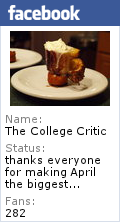In the beginning was the NYPD.
Last time I lost my Philly Cheesesteak virginity.
If you have ever wanted to eat chicken cordon bleu on a sandwich—and you probably have, since a sandwich is cordon bleu gone convenient, edible sans knife and fork while stooped on a street corner feasting among the salary men and flannel—Hamdel can satisfy your desire. The Cordon Blue—not a typo—includes a chicken cutlet or two, thin-sliced ham, mozzarella, and blue cheese dressing. All stuffed into a toasted hero. Great heavy, heaving hearts! Trapped under thick bedsheets of yellow fat! Midterms are upon us, and yet, times have not turned desperate enough to justify a Cordon Blue dinner. Respect your health and pick a different poison.
With its combination of fat on fat on fat on fat, the Cordon Blue provides the necessary calories for hoboing about: hopping freight cars heading Californee way, campfire cookery and pitching tents and growing stupendous beards.
When I first thought to hobo’in, hobo’in
I took a freight train to be my friend, oh Lord
Chicken cordon bleu belongs on melamine plates that grace suburban dinner tables across this great Nation, but one simple transposition—bleu become blue—degrades and despoils the sophisticate. Stuck between stale bread, chicken cordon bleu is sloppy and a real guilt-trip. It belongs in a brown paper bag. A single transcription error degenerates the culinary genome; all royal grace flees before the bastard word. In fact, chicken cordon bleu is an invention of 1960s America: chicken Kiev, a continental classic, downgraded into a supermarket confection. An easy and self-evidently sophisticated preparation for the suburban housewife, chicken cordon bleu quickly entered the mythology of American cooking. Like steak and chips or red wine for the French, chicken cordon bleu absorbed ideology. Physical sustenance transformed into class and political nutrition, fit for bourgeois consumption and excretion. The cordon blue then is a parody, a counter-narrative to the dominant mythology of chicken cordon bleu. Where bleu emphasizes material comfort, Frenchness, and the social world of the continent, blue signifies hardship and hard times, grubbiness and great hunger, and the hobo ethic.
Yes I left my dear old mother, dear old mother
I left my honor, need a crime, oh Lord
I would order this sandwich again as a gesture of rebellion against the bleu ethic.
Next: the Twister (grilled smoked turkey, melted provolone cheese, grilled onions, lettuce, tomato, mustard, and mayonnaise on a toasted hero).

